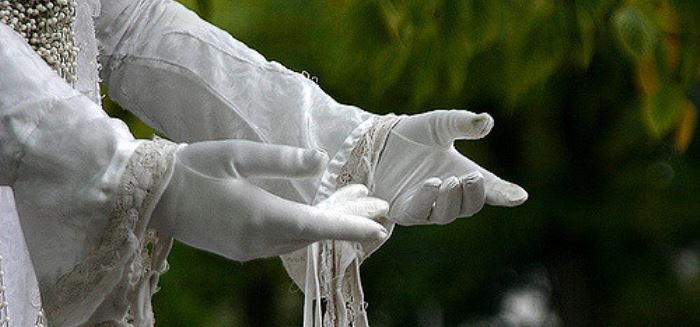Before our July 4 recess, Rev. Dr. Katie Hays shared why people in her new congregation, Galileo Church, give. This week, Katie explains how they give. I love the image of offering baskets filling up with the multi-colored cards described below. “Everybody has something to give,” they say often at Galileo Church. Amen! I’m also impressed by the number of ways the congregation invites — and makes it easy — to give. How might your congregation expand opportunities to give and receive?
Yours truly,
Adam Copeland, Center for Stewardship Leaders
How to Give? However You Can
Rev. Dr. Katie Hays
The Millennials in my three-year-old next-church (non-traditional, emergent, missional) don’t write checks, and they don’t carry cash.
So we encourage electronic giving in several forms. During worship each Sunday, a volunteer pilots a “giving station” where givers can slide their debit card through a Paypal scanner to donate directly from their bank account. (Paypal would obviously take credit cards, too, but we emphasize “debit cards” in our invitation to minimize our dependence on people’s credit card debt.)
We regularly invite people to give through Paypal on our website, as well, acknowledging that shift-work, school schedules, and underdeveloped institutional loyalty keep people from consistently attending Sunday worship.
Finally, we encourage people who are maturing in their spiritual and vocational development to use the “recurring bill pay” feature of their own bank account, if it’s free and their income is relatively stable. The church thus receives numerous paper checks in the mail from the banks of our givers. (Galileo Church is too small, and transacts too little money, for our big bank to grant us an EFT account number, whereby money would transfer electronically from a giver’s account to the church’s.)
The baskets that we pass every Sunday do not, as you might imagine, collect a great deal of money in the moment. But we still pass them as a weekly ritual because we love the liturgical significance of compiling our small gifts into one large offering for the continuation of our life together — the gifts of God for the people of God! To maintain the significance of the baskets and the gifts, our giving station offers several colorful, laminated cards that givers can put in the basket when it comes around at the end of the service.
One card says, “This week I shared with the church ELECTRONICALLY via Paypal, EFT, or billpay. Thanks be to God!”
Another says, “This week I shared with the church MY TIME AND ENERGY for our good work together. Thanks be to God!”
A third says, “This week I shared with the church MY HEART AND PRAYERS for our ongoing life together. Thanks be to God!”
And the last, my favorite: “This week I shared with the world IN AMAZING WAYS you haven’t even thought of yet. Thanks be to God!”
Children and adults alike choose one (or several) of the cards each week, based partly on what kinds of gifts they actually gave, and based at least a little bit on which of the patterned papers makes them feel most joyful. When the baskets are passed through the congregation during our closing song, dozens of these cards pile up, ready to be received at the back of our worship space, sorted out, and recycled for next week’s use.
Our hope is to grow givers who feel empowered rather than shamed when the baskets are passed — “Everybody has something to give,” we often say — and the cards make it unnecessary for anyone to receive the passed basket with empty hands. The cards train people, too, to imagine themselves as givers of whatever resource they’ve got the most of at the moment. Someday, when money is a ready resource for our Millennial givers, we hope that the repeated experience of participating joyfully in the church’s collection of gifts will allow them to practice financial generosity as a natural next step.
More Information
Rev. Dr. Katie Hays is the Lead Evangelist and founder of Galileo Christian Church (Disciples of Christ), or “Galileo” for short. Galileo seeks and shelters spiritual refugees, especially LGBTQ+ neighbors and Millennials, and it happens in lots of places around the Dallas-Fort Worth metroplex — living rooms, taco bars, coffee shops, and the roadhouse bar they rent for Sunday evening worship.
Stewardship Speaker Series: Join us on campus this summer — July 21 and/or August 18 — for breakfast as we hear from groundbreaking stewardship leaders practicing distinctive, top-notch stewardship. Come to one event, or both! All events are free and open to the public. For more information, and to register, visit www.luthersem.edu/stewlead.
Executive Certificate in Religious Fundraising: Luther Seminary, in partnership with the Lake Institute on Faith and Giving, is hosting a four-day intensive course, October 17-20, 2016. For more information visit:www.luthersem.edu/ECRF.

